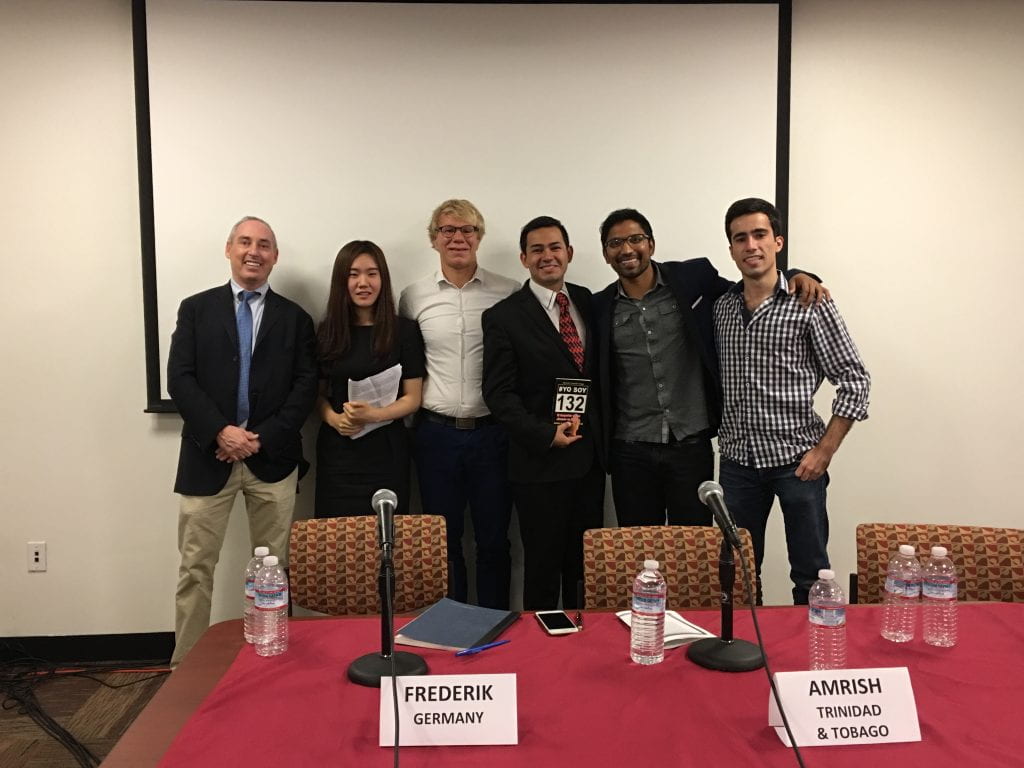A few minutes before 12:00 PM, King Hall was abuzz with quiet anticipation as the last students and staff members trickled in. The international student panel was about to begin, with the controversial presidential election as topic of discussion.
Needless to say, this year’s election has been unlike any other before it, dividing Americans as supporters of either Donald Trump or Hillary Clinton, two candidates who represent increasingly deep and conflicting perspectives on the direction of the country’s future. To limit the current situation to simply a domestic affair would be to greatly underestimate the significance of American politics in the world. Across the globe, people are watching impatiently as the rival candidates exchange blows. USC’s international students have been following the developments with particular concern, and were present in great numbers to witness the multicultural panel that put the U.S. presidential elections into a much needed international perspective.
The panel consisted of five students from different countries (Germany, Trinidad & Tobago, Portugal, South Korea, and Mexico), and was moderated by Dan Schnur, Director of the Jesse M. Unruh Institute of Politics. As the clock struck 12:00 PM, Mr. Schnur opened the discussion by asking the panelists what their overall impressions were of the American electoral system, and a lively discussion followed. All of the panelists voiced concerns about the current state of the electoral system, ranging from confusion about the role of the Electoral College to questioning the very integrity of an election process that is so heavily influenced by the media.
Mr. Schnur explained that the Electoral College is the result of smaller states who, during the formation of the United States, wanted the assurance that their votes would count during an election. By allowing a predetermined number so-called “electors” to vote for a State’s preferred presidential candidate, the less populous states in the country retain a certain level of influence among the larger states, preventing a “tyranny of the majority”.
After a general discussion, the discussion soon turned to the individual countries’ perspectives on the presidential candidates and their most prominent policies. Frederik Pruss, a graduate student from Germany, compared the showiness of the American elections to the more pragmatic German mentality. In the wake of Brexit, Germans are identifying a trend of insular politics that is focused on national preservation. Although similar voices have gone up in Germany in relation to the recent refugee crisis in the European Union, public opinion in general remains favorable to a future within the European Union as well as a liberal immigration policy.
Directly opposing his view was Francisco De Assis Magalhaes Paiva De Sousa from Portugal, who was certain that whereas the majority of Portuguese people would now vote for Hillary Clinton, this would be very different if they had a better understanding of both candidates’ proposed policies. He proposed Donald Trump as a leader who can unite America, whereas Clinton would cater only to her own voters.
Sumin Kim from South Korea and Amrish Ramnarine from Trinidad and Tobago compared the elections to those held in their home countries. South Korea elected its first female president in 2012, when Park Geun-hye defeated her male opponent. On the Caribbean island of Trinidad and Tobago, political affiliations are systematically divided by societal group, with cultural loyalty and extreme rhetoric driving the election process.
Mexico, a country which has been of central importance in the political debate, found representation in Samuel Castelan. Though Samuel was not personally offended by many of Trump’s assertions about Mexico, he confessed that many of his countrymen were, including some very powerful Mexican nationals. This contention has led to Trump receiving very negative press. Samuel further emphasized that both presidential candidates would do well to recognize Mexico’s status as one of the U.S.’s most important trading partners.
The panelists’ views were subsequently submitted to the scrutiny of the audience. The candidates’ relationships with China and other trading partners were discussed, as well as whether the U.S. government needed the hand of a conservative-minded business man like Trump or a career politician like Clinton to achieve America’s goals.
Schnur concluded the debate saying that no matter what political party a person supports, it is essential to the continued existence of democracy that they “unplug their ears” to what the opposing party is saying. Everyone was sent home with one simple homework assignment: for every liberal to inform themselves on a conservative viewpoint on a weekly basis, and vice versa. In summary, the conclusion reached by the panel was that in times of political division, taking to heart the country’s motto of E pluribus unum matters more than ever.
